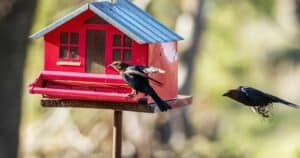Have you reached your wits’ end dealing with those troublesome squirrels that keep destroying your garden and eating your plants? Well, it’s time to fight back – the natural way!
Homemade hot pepper spray is an excellent non-toxic and eco-friendly method for keeping squirrels at bay while doing no harm to them or your garden. Best part? You likely already have most of the ingredients in your kitchen!
In this simple guide, we’ll cover everything you need to know to make your own cayenne pepper spray to repel those bothersome bushy-tailed critters.
How Hot Pepper Spray Works to Deter Squirrels
The active ingredient that makes hot peppers spicy is capsaicin. This compound interacts with pain receptors, causing an intense burning sensation.
When applied topically or ingested, capsaicin triggers squirrel’s pain receptors, making them experience discomfort and irritation. This teaches them to associate your garden and plants with an unpleasant sensation, so they stay far away!
Using homemade hot pepper spray is an all-natural squirrel repellent method that is:
- Non-toxic and safe for kids, pets, and wildlife
- Cost-effective – uses common kitchen ingredients
- Prevents the need for harsh chemical pesticides
- Easy to make at home
Now let’s look at the best recipes and ingredients for keeping squirrels at bay.
How Much Pepper Spray is Needed to Repel Squirrels?
When making homemade hot pepper garden sprays, you may be wondering just how much cayenne pepper or hot sauce is needed to effectively deter those pesky squirrels. Here are some tips on ideal pepper spray concentrations:
- For cayenne powder – 1-2 teaspoons per quart of water is usually sufficient. This produces moderate heat and irritation.
- For hot sauce – Use a 5:1 ratio of water to hot sauce. For example, mix 1 quart of water with 3-4 ounces of hot sauce.
- For chopped peppers – 2-3 finely chopped peppers per quart of water creates adequate heat.
- Increase concentrations gradually – Begin with milder versions and slowly increase pepper amounts if squirrels continue to be unfazed.
- Test on plants first – Start with weaker mixtures and test on small plant areas before widespread spraying to avoid burning leaves.
Keep in mind that higher pepper concentration does not necessarily equal better results. Extremely strong mixtures may damage plants and still not fully deter squirrels.
Find the lowest effective dose through trial and error observations. Target problem areas first and make adjustments based on squirrel reactions. With the right pepper spray strength, you’ll strike the optimal balance between driving squirrels away and keeping your garden safe.
Top Hot Pepper Spray Recipes for Repelling Squirrels
Here are some of the most effective DIY hot pepper spray recipes:
Cayenne Pepper Spray
Ingredients:
- 1 quart water
- 1 teaspoon cayenne pepper
- 1 teaspoon paprika
- 2 chopped jalapeno peppers
Instructions:
- Bring water to a boil and add the dry spices and chopped peppers.
- Let mixture simmer for 20 minutes, then remove from heat.
- Strain the liquid into a spray bottle using a cheesecloth or fine mesh strainer.
Spicy Tabasco Spray
Ingredients:
- 1 gallon water
- 1 small bottle Tabasco sauce
- Optional: 1 egg or drops of dish soap
Instructions:
- Pour water into a large container and add Tabasco sauce.
- For trees, add 1 egg. For leaves, add a few drops of dish soap.
- Transfer to a spray bottle.
Onion and Pepper Spray
Ingredients:
- 1.5 quarts water
- 1 teaspoon cayenne pepper
- 2 chopped onions
- 1 chopped jalapeno
Instructions:
- Boil water and add dry and chopped ingredients.
- Let simmer 20 minutes then strain into a spray bottle.
How to Apply Hot Pepper Garden Spray
Once you’ve made your homemade pepper spray, here are some tips for applying it safely and effectively:
- Test spray on small area first to ensure no damage to plants
- Wear gloves and eye protection when applying
- Spray when no rain or wind expected for 24 hours
- Focus on known squirrel entry points and feeding areas
- Reapply weekly for best results
- Store spray in cool, dark place between uses
Plants and Areas to Protect from Squirrels
Some specific plants and areas that attract squirrels include:
- Vegetable and flower gardens
- Fruit trees and berry bushes
- Bird feeders
- Attic entry points and trees near roof
- Deck railings and exterior furniture
Is Pepper Spray Edible?
When researching homemade hot pepper repellent sprays, some people may wonder – can I actually eat this stuff too?
The answer is no – pepper sprays designed for repelling squirrels and other critters should never be ingested by humans or pets.
There are a few reasons pepper sprays are not meant to be eaten:
- Very high concentrations of capsaicin – Pepper sprays contain extremely high amounts of capsaicin extracted from chili peppers. Consuming this chemical compound can cause severe mouth, throat, and stomach irritation, pain, and inflammation.
- Not food-grade ingredients – Repellent sprays use ultra-concentrated hot sauce and pepper extracts not intended for human consumption. The ingredients and production methods are not regulated for eating.
- Risk of injury – Accidentally ingesting pepper spray could cause damage to the esophagus and digestive tract, resulting in hospitalization.
While small amounts of cayenne or other chili peppers can safely be eaten by humans, the high potency of capsaicin in squirrel repellent sprays makes them very dangerous to ingest. The extreme burning sensation in the mouth and throat is the body’s way of signaling that it’s harmful if swallowed.
So while hot pepper garden sprays are harmless for repelling intruders when used topically, they should never be tasted or eaten under any circumstances. Stick to adding small amounts of cayenne to your meals for a spicy kick instead!
Is Pepper Spray Safe for Other Pets?
When using homemade hot pepper repellent sprays around your garden and outdoor areas, you may be wondering – could this hurt my dog, cat, or other pets if they come into contact with it?
The good news is that pepper sprays are generally safe for dogs, cats, and other domestic pets when used properly and in moderation. Here are some tips to ensure pepper repellents don’t harm your furry friends:
- Avoid direct contact with eyes and nose – Pepper sprays can be irritating if sprayed directly into pets’ faces. Keep applications low to the ground.
- Use milder pepper spray recipes – Formulas with lower concentrations of peppers are less likely to irritate.
- Rinse off paws – If pets walk through sprayed areas, wipe or rinse off their paws to prevent licking irritation.
- Monitor for reactions – Discontinue use if pet shows signs of irritation like paw chewing or head shaking.
- Keep pets away during application – Keep pets indoors when first applying spray and for at least an hour after to allow it to dry.
- Focus spray in small targeted areas – Don’t liberally spray entire lawns or gardens. Target known squirrel entry points.
Natural Ways to Deter Squirrels
Here are some other natural options to try in conjunction with or instead of hot pepper spray:
- Spread cayenne pepper flakes around gardens
- Use scent repellents like garlic, mint, or vinegar
- Install physical barriers like fencing
- Scare them away with predator decoys
- Use ultrasonic or water spraying repellents
Follow these tips to whip up your own natural hot sauce squirrel repellent and keep those frustrating furry thieves out of your garden for good. With some trial and error, you’ll be on your way to a squirrel-free outdoor space. Good luck!





